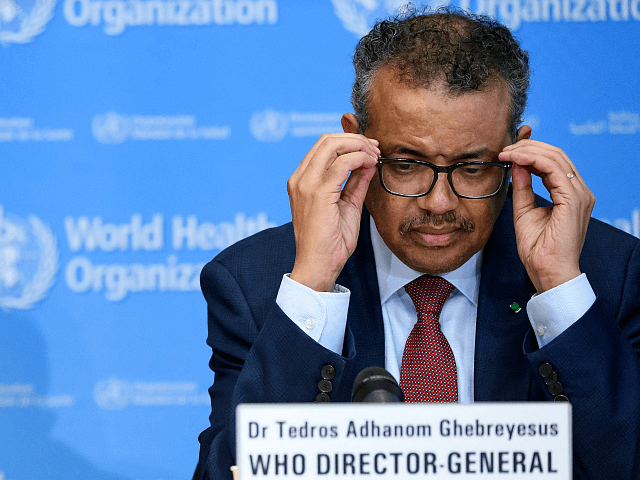The United States is looking for alternate partners to carry out health programs previously supported through the World Health Organization (W.H.O.) in the wake of U.S. President Donald Trump’s decision to freeze funding to the United Nations agency, American officials indicated this week.
Trump administration officials are conducting a 60-to-90 day review of the Beijing-influenced W.H.O.’s response to the novel coronavirus illness (COVID-19) ravaging the world.
Echoing other U.S. officials, Secretary of State Mike Pompeo has repeatedly accused the W.H.O. of helping China hide the severity of the novel coronavirus illness during its early stages, a move that slowed the world’s response and allowed the disease to spiral out of control.
Although the United States is the W.H.O.’s top source of funding, communist China appears to maintain more clout over the U.N. agency, particularly after helping put Tedros Adhanom Ghebreyesus in power as the organization’s director.
James Richardson, the director of the Office of U.S. Foreign Assistance Resources at the U.S. Department of State, told reporters on Wednesday:
This [W.H.O. funding] pause will not impact our commitment to fight COVID around the world. We are focused on outcomes, and as such we are working with other partners around the world, including community and faith-based organizations, to get the job done.
…
This pandemic can’t wait for the review … and so for every contract or every dollar flowing today, we’re just taking W.H.O. off the table and we’re going to provide that assistance to these other organizations in order to get the job done.
“At the end of the day, this should be about saving lives, not about saving a bureaucracy,” Richardson also said.
During the press briefing, U.S. officials failed to say what conditions the U.N. agency will have to meet to see its funding resumed.
Some federal health officials have said they hope to continue working with the W.H.O. on existing partnerships despite the funding halt.
Richardson, however, reportedly indicated that the Trump administration funding freeze will only impact “new decisions to provide assistance” to health programs carried out through the W.H.O.
“There is a lot of existing contracts that we’ve already essentially sent the check to pay for individuals, and we’re not asking for refunds at this point,” Richardson explained.
He noted that the W.H.O. “only receives about 4 percent of U.S. global assistance.”
“There are plenty of amazing and highly qualified organizations implementing these programs around the world, and to be honest, no organization — or country, for that matter — is owed a single nickel from the American people,” Richardson added.
The United States Agency for International Development (USAID), an independent federal agency charged with administering civilian foreign aid and development assistance, is already looking to find other partners to take over programs that the American government may have implemented through W.H.O.
During the press briefing Wednesday, USAID Acting Administrator John Barsa indicated that, even before the funding freeze and the onset coronavirus pandemic, his agency was engaged in efforts to diversify its partner base and work with a broader range of organizations that will facilitate the process of looking for other health allies.
Barsa declared:
We’re looking for different partners right now in terms of — working polio or any number of health issues — are there other entities, local community-based entities, faith-based organizations, are there other groups that can continue on this work. So part of the assessment that is taking place during this 60-to-90-day pause is to evaluate the availability of new partners to carry out this work.
On Wednesday, U.S. Secretary of State Mike Pompeo, who also briefed reporters, announced an additional $270 million in American taxpayer-funded aid for the international coronavirus response, bringing the total amount of U.S. assistance to $775 million spread over 100 countries worldwide.
“For more than half a century, the United States has been the largest contributor to global health security. We have built the foundations upon which the global health system is based,” Richardson noted.
The U.S. has “dedicated more than $140 billion in global funding for global health purposes in the past two decades,” Pompeo said.
“We estimate that the American people, in cume, have given nearly $3 billion in donations and assistance just to fight this particular virus,” he added, referring to U.S. government assistance combined with aid from independent American sources.
Some U.S. aid is targeting countries that do not normally see American assistance, the global development U.S.-based outlet Devex reported.
The U.S. National Institutes of Health (N.I.H.) director, Dr. Francis Collins, said this week that his federal agency hopes to continue working with the W.H.O. on several “existing partnerships” despite the funding halt.
“Given the W.H.O. is a major player in that global health arena, we’d hope to be able to continue to work with them in some productive way,” he said.
After Trump announced the funding pause, Dr. Robert Redfield, the director of the Centers for Disease Control and Prevention (CDC), also said, “W.H.O. has been a longstanding partner for C.D.C. We’ve worked together to fight health crises around the world. We continue to do that.”

COMMENTS
Please let us know if you're having issues with commenting.